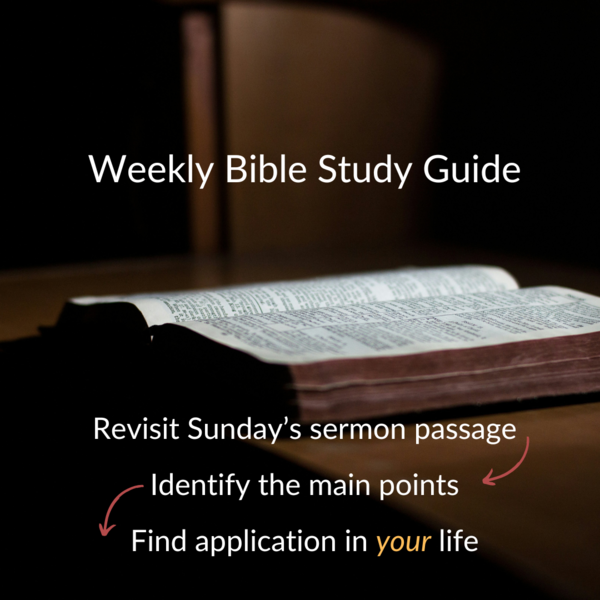|
|

|
The Weekly Bible Study Guide
Hello Grace Family! Welcome back to the weekly Bible Study Guide! This resource gets us back into the same Bible passage we heard preached on Sunday, and does three things: 1. Breaks down the main points. 2. Asks questions for application in your life. 3. Prompts for focused prayer. Remember, we live not by bread alone, but by every word which proceeds from the mouth of God (Dt. 8:3; Mt. 4:4). |

|
1 Corinthians 5:1–13, "We Protect the Gospel of Christ"
First, pray. Ask the Lord to open your eyes, that you might behold wondrous things out of his Word (Ps. 119:18). Second, read the passage. Feel free to read it more than once, or in another translation. Third, review the sermon outline. Try to see how the points came out of the text. Fourth, answer the questions below. Focus on personal application. Fifth, pray. Praise and thank the Lord, then ask him to work in mighty ways. |

|
The Passage: 1 Corinthians 5:1–13
1 It is actually reported that there is sexual immorality among you, and of a kind that is not tolerated even among pagans, for a man has his father’s wife. 2 And you are arrogant! Ought you not rather to mourn? Let him who has done this be removed from among you. 3 For though absent in body, I am present in spirit; and as if present, I have already pronounced judgment on the one who did such a thing. 4 When you are assembled in the name of the Lord Jesus and my spirit is present, with the power of our Lord Jesus, 5 you are to deliver this man to Satan for the destruction of the flesh, so that his spirit may be saved in the day of the Lord. 6 Your boasting is not good. Do you not know that a little leaven leavens the whole lump? 7 Cleanse out the old leaven that you may be a new lump, as you really are unleavened. For Christ, our Passover lamb, has been sacrificed. 8 Let us therefore celebrate the festival, not with the old leaven, the leaven of malice and evil, but with the unleavened bread of sincerity and truth. 9 I wrote to you in my letter not to associate with sexually immoral people— 10 not at all meaning the sexually immoral of this world, or the greedy and swindlers, or idolaters, since then you would need to go out of the world. 11 But now I am writing to you not to associate with anyone who bears the name of brother if he is guilty of sexual immorality or greed, or is an idolater, reviler, drunkard, or swindler—not even to eat with such a one. 12 For what have I to do with judging outsiders? Is it not those inside the church whom you are to judge? 13 God judges those outside. “Purge the evil person from among you.” |

|
Outline
Intro: As we continue our series on aspects of a healthy church, the fifth is biblical church discipline. We can divide the text into four sections: (1) The Sin, (2) The Sentence, (3) The Significance (for the church), and (4) The Separation (the right kind vs. the wrong kind). I. The Sin: (v. 1–2a). Within the church in Corinth, a man was having an affair with his father's wife. This was so eggregious that even the pagan Corinthians would not have tolerated it. It was also ongoing, indicating a lack of repentance from the man. And the church was arrogant (or proud) about it, when they should have mourned and dealt with it. These sins posed grave threats to the church and its witness to Christ. II. The Sentence: (v. 2b–5). The church was to remove the unrepenant man from their fellowship. This is called church discipline. We can clear up some misconceptions about church discipline with four truths: (A) Discipline isn't taken because someone's sins are too bad, but because he/she will not repent. Remember that Paul was previously persecuting Christians, putting them in prison, and putting them to death. If anyone's sins precluded membership, it was his. Yet no one is beyond the grace of God! (B) Discipline does not contradict "do not judge" in Matthew 7; it actually upholds the proper kinds of judgment given to the church in Matthew 18. We don't judge someone's eternal destiny, but we do judge things like professions of faith, sin & repentance, and true and false doctrine. (C) Discipline isn't unclear or infrequent in Scripture; see Matthew 18:15–17; 1 Corinthians 5:1–13; 2 Corinthians 2:5–11; Galatians 6:1; 1 Thessalonians 5:14; 2 Thessalonians 3:6–15; 1 Timothy 1:19–20; 1 Timothy 5:19–20; and Titus 3:9–11. (D) Discipline isn't unloving; it's the most loving thing you can do. In love, it refuses to allow someone to continue in the delusion that he/she can be a Christian and live in unrepentant sin. This lifestyle calls into question their faith in Christ. Discipline is taken in hope that if the individual truly believes in Christ, he/she will realize the wrongdoing, repent, and return to the church. As Paul says in v. 5, "that his spirit may be saved in the day of the Lord." III. The Significance (for the church): (v. 6–8). Like rotten leaven spreading and poluting the whole lump of dough, if the church tolerates this sin, it will spread. Rather, since Christ died for us ("our Passover lamb"), we are to be morally pure (like "unleavened bread"). IV. The Separation (the right and wrong kind): (v. 9–13). Being without "leaven" doesn't mean separating from unbelievers who continue in sin (then you would have to leave the world, plus it's precisely they who need to hear the Gospel). Rather, the church is to separate from those who "bear the name of brother" -- those who claim to be in Christ -- if they continue in their unrepentant sin. Their sinful lifestyle dishonors, corrupts, and undermines the church's witness to the world. Conclusion: By practicing biblical church discipline, a healthy church protects the Gospel of Jesus Christ. If we ever encounter such a situation at Grace, will we have the courage and faithfulness to carry it out? |

|
Questions
1. The church in Cornith was tolerating the man's sin, and some may have even been proud about it. It's possible they were embracing a kind of "cheap grace" theology, claiming it doesn't really matter how you live, because we're saved by grace. - Have you heard this viewpoint before? Why is it attractive? - Which passages of scripture teach us that obedience is essential to the Christian life? - What is a biblical understanding of the relationship between faith and works? - How can the toleration of sin spread in a church? - What can we do to uphold that salvation is by grace, and instill a culture of humble obedience?
2. Paul shows that church discipline is beneficial for the individual: (1) for the destruction of the "flesh" (overcoming one's sinful propensities), and (2) that one's spirit may be saved in the day of the Lord (the person who is truly in Christ will repent and be saved). - Why is church discipline sometimes portrayed as unloving or judgmental? - How can churches ensure that they are not being unloving, and are not simply calling out "worse" sins? - How did Jesus equip the church to be both loving and fair? (see Matthew 18:15–20) - How should the church receive the person who repents? (see 2 Corinthians 2:5–11)
3. Paul also shows that church discipline is beneficial for the church: (1) to protect the church from the spread of sin, and (2) to protect the church's witness to the world (the Gospel). - How have you seen sin spread within a group or community? - Why is the church's reputation in the outside world significant? - What do you want the outside world to know about Grace Church? |

|
Prayer
1. Praise God for his grace toward us in Christ, without which none of our sins would be forgiven. 2. Thank God for adopting us into his family through Christ. Thank him that we are brothers and sisters, here to help each other follow Christ together. Pray that we will continue in obedience. 3. Ask that if we should stumble or go astray into sin, our church family would lovingly call us back to Christ through repentance. 4. Pray that we will be willing and able to do the same for others. 5. Ask that the church's witness for Christ would shine brightly in the world, and that our sin would not cover it. 6. Continue to ask God to make us a healthy church. |

|
Thanks
Thanks for reading the Bible Study Guide! I pray it helps us "continue to grow up in every way into him who is the head, into Christ" (Eph. 4:15).
Sincerely, your brother in Christ, Tom Hansen, Senior Pastor |
